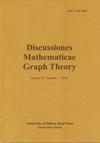Turán跨越星林的数量
IF 0.8
4区 数学
Q3 MATHEMATICS
引用次数: 2
摘要
设F是一个图族。F的Turán个数,用ex(n,F)表示,是一个有n个顶点的图中不包含与F中某个图同构的任何子图的最大边数。星林是一个连接的组件都是星和孤立顶点的森林。受Wang, Yang和Ning关于线性森林跨越Turán数量的结果的启发[J]。王伟,杨伟,Turán跨越线性森林数,计算机学报。数学。254 (2019)291-294;宁斌,王军。Turán线性森林跨越数的计算公式[j].离散数学,343(2020):111924。本文设Sn,k为具有n个顶点和k条边的所有星林的集合。证明了当1≤k≤n−1时,ex(n,Sn,k) =⌊k−12⌋。本文章由计算机程序翻译,如有差异,请以英文原文为准。
The Turán number of spanning star forests
Let F be a family of graphs. The Turán number of F , denoted by ex(n,F), is the maximum number of edges in a graph with n vertices which does not contain any subgraph isomorphic to some graph in F . A star forest is a forest whose connected components are all stars and isolated vertices. Motivated by the results of Wang, Yang and Ning about the spanning Turán number of linear forests [J. Wang and W. Yang, The Turán number for spanning linear forests, Discrete Appl. Math. 254 (2019) 291–294; B. Ning and J. Wang, The formula for Turán number of spanning linear forests, Discrete Math. 343 (2020) 111924]. In this paper, let Sn,k be the set of all star forests with n vertices and k edges. We prove that when 1 ≤ k ≤ n− 1, ex(n,Sn,k) = ⌊ k−1 2 ⌋ .
求助全文
通过发布文献求助,成功后即可免费获取论文全文。
去求助
来源期刊

Discussiones Mathematicae Graph Theory
MATHEMATICS-
CiteScore
2.20
自引率
0.00%
发文量
22
审稿时长
53 weeks
期刊介绍:
The Discussiones Mathematicae Graph Theory publishes high-quality refereed original papers. Occasionally, very authoritative expository survey articles and notes of exceptional value can be published. The journal is mainly devoted to the following topics in Graph Theory: colourings, partitions (general colourings), hereditary properties, independence and domination, structures in graphs (sets, paths, cycles, etc.), local properties, products of graphs as well as graph algorithms related to these topics.
 求助内容:
求助内容: 应助结果提醒方式:
应助结果提醒方式:


